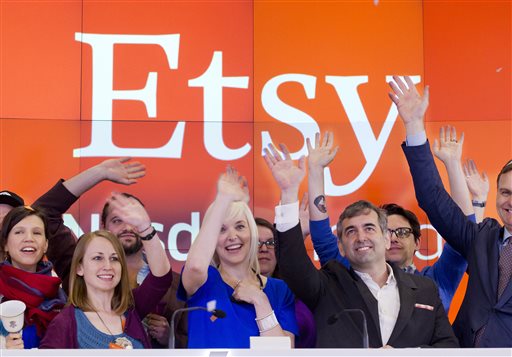
By Kathryn Wolper
According to The New York Times, Etsy, a website that allows artisans to sell their handmade goods all over the world, is testing a program that pairs creators with manufacturers. This new program carries with it many challenges as Etsy strives to maintain its hallmark commitment to the integrity of small-business- owning artisans and their handmade goods.
The risk that Etsy runs in such an endeavor is to alienate smaller businesses by allowing those who pair with manufacturers to dominate the market.
In approving the partnerships between artisans and manufacturers, Etsy could show preference for shops that already dominate the market, thus allowing them to increase their lead over competing shops. Furthermore, the jump from entirely handmade goods to manufactured goods could compromise Etsy’s goals and alienate customers who shop with the intention of buying strictly handmade goods.
Etsy demonstrates its commitment to the artisans who make it successful through strict measures of ethics. The online application for artisans who want to work with manufacturers emphasizes three principles that must support partnerships between artisans and manufacturers: authorship, responsibility and transparency. In this situation, lower ethical standards could lead to bigger companies dominating Etsy, which would presumably be profitable for the website. However, artisans and small business owners who rely primarily on Etsy to do business should feel encouraged by the site’s commitment to integrity and craftsmanship.
While inconvenient for some, the nuanced and thorough process of applying for a manufacturing partnership through Etsy seems to ultimately give successful Etsy artisans the opportunity to grow, become more profitable and focus more energy on creativity of design.
The process seems to empower creators and encourage symbiosis between manufacturers and creators. The creators can pour more energy into expanding the line of products they offer and focusing on creative details, while the manufacturers can rely on retaining steady business.
Etsy’s careful consideration of the possible pitfalls of introducing manufacturing into its marketplace for handmade goods is evident in the language used in the application for a partnership between a manufacturer and an artisan. Etsy lists its ethical expectations for manufacturers, which include fair working conditions, non-discrimination and sustainability. In a refreshingly ethical business move, Etsy seems more focused on fostering a positive relationship between creator, producer and consumer than making exorbitant amounts of money. Although the economic implications of these new partnerships are bound to be relatively small, the ethical precedent set by Etsy, a powerhouse of an online marketplace, is encouraging.



































































































































































































